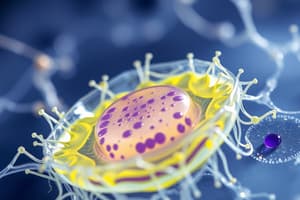Podcast
Questions and Answers
What is one of the preventive health care measures to prevent viral infections in animal tissue culture?
What is one of the preventive health care measures to prevent viral infections in animal tissue culture?
- Washing hands regularly with soap and water (correct)
- Isolating infected animals from other animals
- Using antiviral medications
- Evaluating animals before using their tissues
What is the primary goal of evaluating animals before using their tissues?
What is the primary goal of evaluating animals before using their tissues?
- To select the most suitable animals for tissue culture
- To determine the effectiveness of antiviral medications
- To develop an appropriate treatment plan for viral infections
- To identify signs of viral diseases (correct)
What factor contributes to the incidence of viral infection in animal tissue culture?
What factor contributes to the incidence of viral infection in animal tissue culture?
- The type of virus (correct)
- The type of animal used
- The availability of sterile tools and equipment
- The presence of antibiotics
Who should be consulted to provide the correct diagnosis and develop an appropriate treatment plan for viral infections in animal tissue culture?
Who should be consulted to provide the correct diagnosis and develop an appropriate treatment plan for viral infections in animal tissue culture?
Why is it important to use clean and sterile tools and equipment in animal tissue culture?
Why is it important to use clean and sterile tools and equipment in animal tissue culture?
What is tissue culture defined as?
What is tissue culture defined as?
What is required for the growth and reproduction of cultured cells?
What is required for the growth and reproduction of cultured cells?
How can viral infections be transmitted from one animal to another?
How can viral infections be transmitted from one animal to another?
What is one of the general measures to reduce the risk of viral infection in animal tissue culture?
What is one of the general measures to reduce the risk of viral infection in animal tissue culture?
What is the main application of tissue culture in biology?
What is the main application of tissue culture in biology?
What is included in the agricultural media used for tissue culture?
What is included in the agricultural media used for tissue culture?
Flashcards are hidden until you start studying
Study Notes
Tissue Culture Definition
- Tissue culture is a biological technique for growing cells and tissues of living organisms outside the body in a laboratory.
- It involves using agricultural media, such as agar, that provides essential nutrients like simple sugars, vitamins, and hormones for cell growth and reproduction.
Importance of Sterility
- Tissue culture requires sterile laboratory conditions and a constant supply of nutrients for cell growth.
- Sterile tools and equipment are essential in all activities related to animal tissue culture.
Viral Infections in Animal Tissue Culture
- Viral infections can occur in animal tissue culture through direct contact, droplets, vectors, and mother-to-offspring transmission.
- The incidence of viral infection depends on the type of virus, mode of transmission, and its effect on animals and humans.
Preventive Measures
- Wash hands regularly with soap and water, or use hand sanitizer if soap and water are not available.
- Evaluate animals before using their tissues to ensure no signs of viral diseases.
- Ensure personal hygiene and general hygiene on the farm or facility that grows animal tissue.
- Avoid direct contact with animals infected with viral diseases.
Treatment of Viral Infections
- Treatment may include antiviral medications, immune-supportive measures, and isolation of infected animals.
- Consult an expert in veterinary or human medicine for correct diagnosis and an appropriate treatment plan.
Studying That Suits You
Use AI to generate personalized quizzes and flashcards to suit your learning preferences.




